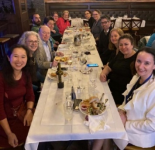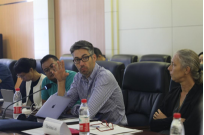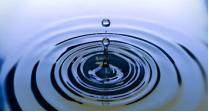Welcome to this special holiday issue of our Substack Newsletter ‘News and Views’ with a focus on COMMUNITY. Reflecting on our year as 2023 draws to a close we have had a busy and successful 12 months building and deeply engaging with our own international law community; a year rich in research, with several key meetings, and major steps forward with our pioneering Charting a Path Initiative and Emerging Scholars Initiative. The Academy also making progress on its commitments to supporting the SDGs and the World Water Agenda. Building on the momentum catalysed at our Launch in Wuhan September 15, the Academy leverages its network and research to contribute to enhancing transboundary water cooperation and meeting the UN SDGs.

As we see the problems of conflicts and climate change in the world today, community has never been more important. Communities are varied and they can be local or global. Many local communities are struggling with the impacts of conflicts and climate change. The global community of scientists, governance specialists and environmental and water lawyers are working hard on solutions. You will find some of those solutions that water law can support in this issue and we highlight the need for different communities to work together towards those solutions. This beautiful tapestry of trees touching branches represents how we like to think about the inter-relatedness of communities connecting to each other, standing tall and proud, but with a desire to protect and shelter their environment together with other communities. As members or our international water law community we wish you a very wonderful holiday season and we look forward to our future collaboration in 2024! With my sincerest thanks to each and all, especially our Founding Affiliates, our Wuhan home team and our excellent communications group! Watch this space for exciting Academy news in the New Year!
The Academy’s Charting a Path Initiative (CAPI)
In 2020 the Academy introduced its Charting a Path Initiative (CAPI) to 2030 and Beyond, to examine issues like climate change and equitable use to seek solutions to the problems facing transboundary water management. In Wuhan, through CAPI, we explored how convergent rules of international law contribute to transboundary water cooperation and the Water Action Agenda established at the UN Water Conference in New York in March 2023, and together we identified how we can make a practical difference.
New Publications
Special Issue – Voices from Emerging Scholars

In 2022, Dr. David J Devlaeminck and Prof. Patricia Wouters invited emerging scholars in international water law to contribute short blog posts on the challenges faced by transboundary water cooperation under international law. We received various responses, some of which were posted on the Global Water Forum. We then selected blogs to be expanded into a full-length article, for publication in a special issue of the Journal of Water Law with Lawtext Publishing Limited. The special issue is now out, featuring articles from 6 authors (Zaki Shubber, Mohsen Nagheeby, Imad Antoine Ibrahim, Aline Telle, Kerry Neal and Chenjun Zheng) on various emerging topics in international water law, as well as a book review of Melissa McCracken's book, Defining Effective Transboundary Water Cooperation, written by Miharu Hirano. This special issue began as a part of the "Charting a Path" initiative of the International Water Law Academy, revisiting the global water conventions in their anniversary year.
Emerging scholars are an important part of the international water law community and are key to resolving the water challenges of the future! We must join together in elevating their voices, placing them in the spotlight alongside more established scholars, offering mentorship and advice, promoting them and their work, but most importantly by integrating them into the greater water law community. We welcome you to join us in this important endeavour – let us ‘Chart a Path’ together! More information on the special issue can be found here: https://www.lawtext.com/publication/the-journal-of-water-law/contents/volume-28/issue-1
Advanced Introduction to International Water Law
Elgar Advanced Introduction Series, Owen McIntyre
December 2023

Prof. Owen McIntyre is Professor at the School of Law, University College Cork (National University of Ireland), where he is the Director of the LL.M. (Environmental & Natural Resources Law) Programme and as Co-Director of the Centre for Law & the Environment. He is an expert in International Environmental Law, with a research focus on International Water Law. He has served as the inaugural Chair of the IUCN World Commission on Environmental Law's Specialist Group on Water and Wetlands and Water and on the Scientific Committee of the European Environment Agency.
https://www.e-elgar.com/shop/gbp/advanced-introduction-to-international-water-law-9781802206722.html
Climate change - how water law can support some solutions for the energy transition
Because of the immensity of the impact of climate change, there is a necessity for different communities to interact and this is where the Academy provides entry points into these issues in terms of the diverse expertise of its affiliates. The water law, climate change and biodiversity communities intersect to address issues regarding cleaner energy, agriculture (which uses 70% of water) and biodiversity.
At the recent COP 28 in Dubai, the impact of climate change on the water sector has received more attention than in previous years. Droughts, floods and forest fires are devastating communities around the globe. While international water law cannot solve the problems alone, it can play a key role in providing some solutions to this crisis. These include developing resilience and adaptation at international, regional, and local levels. Integrated Water Resources Management and a comprehensive legal framework for transboundary waters and coastal areas form the basis for good management practices through the legal obligations of due diligence and duty to cooperate. Some of the solutions include ecosystem protection and wetlands conservation because wetlands can sequester carbon. Hydropower can help in terms of non-carbon energy provision and wastewater can generate electricity to reduce carbon emissions, while preventing pollution. Read on to find out more about these three areas, which are part of the solutions to an energy transition.
Wetlands
Peatlands cover about 3% of our planet's land and store approximately 30% of all land-based carbon – twice the amount than all the world's forests combined, so wetlands are effective carbon sinks. There are currently 234 Wetlands of International Importance listed with the Convention on Wetlands of International Importance (Ramsar Convention 1971) that share borders with two or more countries with a total of 91 countries). At this time, 14 of these areas have become officially recognized transboundary conservation areas with a shared management regime.

Academy affiliate, Dr. Michael Hantke-Domas, is Associate Professor in the Faculty of Law and Government at San Sebastián University (Chile), and Vice Chair of the Water and Wetland Law Specialist Group at the IUCN World Commission on Environmental Law. He is an internationally recognized lawyer for his professional and academic practice in water law, natural resources law and environmental law. His experience stems from more than 25 years of experience as a judge, academic, lawyer, public servant, international official and consultant. Under the lead of Stefano Burchi, the IUCN Water and Wetlands Specialist Law Group is engaged in various areas of importance for climate change. Below are some of the themes that the Water and Wetland Law Specialist Group work on internationally:
· Judiciary and water (comments on 2018 Brasilia Declaration of Judges on Water Justice),
· Reverberations in domestic and in international law of the ecosystem support function of groundwater,
· International liability for environmental damages caused in transboundary waters, and
· Commentary to the manifesto for national integrated legal frameworks for water resources governance.
Around these four themes, members from around the world are developing ideas that will contribute to future discussions on international water law.

Hydropower
Hydropower is a renewable source of energy. The energy generated through hydropower relies on the water cycle, which is driven by the sun, making it renewable.

Although hydropower is fueled by water, making it a clean source of energy, hydropower facilities can have large environmental impacts by changing the environment and affecting land use, homes, and natural habitats in the dam area. IWLA affiliates participated in an expert group on hydropower, and they developed this checklist for the legal framework surrounding hydropower development. Checklist for Assessing the international law applicable to transboundary hydropower
Bernadette Adjei, Ana Maria Daza Vargas, David J Devlaeminck, Oliver Hensengerth , Emmanuel Kasimbazi, Kong Lingjie, Owen McIntyre, Alistair Rieu-Clarke , Otto Spijkers, Patricia Wouters
Northumbria University, 2023
https://researchportal.northumbria.ac.uk/en/publications/checklist-for-assessing-the-international-law-applicable-to-trans
Wastewater as Energy

The Global Wastewater Initiative (GWWI) is a multi-stakeholder platform bringing together different United Nations agencies, NGOs, academia, the private sector, development banks, and others. The GWWI has been working over the past 10 years to implement and scale-up efforts to tackle wastewater pollution worldwide. Established in 2013 it is anchored to the Global Programme of Action for the Protection of the Marine Environment from Land-Based Activities (GPA). Wastewater can produce about 5 times more energy than is required for its treatment and is an important solution to the climate crisis. UNEP's Global Wastewater Initiative urges governments and businesses to treat wastewater as a circular economy opportunity rather than as a disposal problem: https://lnkd.in/eaqz8gWb

IWLA Affiliate Dale Campbell was one of 4 authors of a 2015 UNEP report on legislation related to wastewater. https://www.unep.org/resources/report/good-practices-regulating-wastewater-treatment-legislations-policies-and-standards
A focus for 2024 – Community, Convergence and Due Diligence

Looking forward to 2024, IWLA will hold expert meetings in Edinburgh, Hong Kong and Shenzhen on convergence and due diligence. The University of Edinburgh Law School will host an expert meeting on convergence of international (water) law and, the legal issue of due diligence. Dr. Ana-Mara Daza Clark will be one of the key organisers and hosts of the meeting at The University of Edinburgh Law School where she teaches. Her research and teaching focuses on International Economic Law, International Investment Law and Arbitration, WTO Law, International Water Law, and Management of Natural Resources. She is Programme Director of the International Economic Law LL.M at the University of Edinburgh, and provides expert advice to governments, foreign investors and international organisations.
Special Issue - Journal of Energy and Natural Resources Law
Integral to CAPI is impact, through research and active outreach. Scholarship from the Wuhan conference and CAPI is forthcoming in a collected work to be published in the Journal of Energy and Natural Resources Law (Taylor and Francis). Don Smith will be Managing Editor and Prof. Patricia Wouters and Dr. David J Devlaeminck and Dr. Ana-Maria Daza Clark are guest editors. The central theme of this collected work will be ‘Community in international (water) law’, drawing on the inaugural lecture of Prof. Patricia Wouters at the Wuhan Conference.
Project on Convergence

Participants at the Wuhan meeting suggested that a legal project on Convergence should be done through a series of research works, workshops and expert meetings under the leadership of Prof. Owen McIntyre, with support from Prof. Kong Lingjie and Prof. Patricia Wouters. This project requires funding and strategic vision, which the Academy agreed to take forward. The Edinburgh conference set for end of June/first of July 2024 will include a day on this topic.

Working Group on Water Law – Global Forum on Law, Justice and Development, World Bank
Dr. Christina Leb, Senior Counsel at the Environment and International Law Department (LEGEN) of the World Bank leads a new Water Law Working Group under the Global Forum on Law, Justice and Development (GFLJD) housed at the World Bank. The GFLJD Charter provides for a 2-year lifetime of working groups. A first meeting has been held in December to look at the development of the programme of the new working group.
MEETINGS 2023
In 2023 our affiliates presented their research at events all over the world. Here are a few highlights from some of those meetings:

The UN Water Conference, New York, March 21-22, 2023
At this meeting in addition to presentations and panel discussions, the Academy made a commitment to supporting transboundary water governance under the Water Action Agenda.
Expert Meeting on Hydropower, Bologna University, Bologna Italy,
March 9-10, 2023
Affiliates Prof. Alistair Rieu-Clarke, Prof. Owen McIntyre, Dr. Ana Maria Daza-Clark, Dr. David J Devlaeminck and Prof. Patricia Wouters attended this expert meeting.
The IUCN AEL Colloquium,
Future-Proofing Law in a Time of Environmental Emergency

Joensuu Finland, July 31-August 4, 2023
Held at the University of Jeonsuu in Finland, IWLA affiliates Harro Van Asselt and Prof. Antti Belinjski were key organisers and special sessions were organised on water law. Delegates Prof. Owen McIntyre, Dr. Yang Liu and Chenjun Zheng attended in person and a number of affiliates presented online such as Prof. Patricia Wouters, Dr. David J Devlaeminck and Dr. Susanne Schmeier.
The World Water Week, Stockholm, August 20-24, 2023
Global affiliates, Dr. Susanne Schmeier, Dr. Yumiko Yasuda, Mr. Sylvester A. Matemu attended heading up expert panels and presenting their research.
International Water Resources Association
World Water Congress
Beijing, China, September 11-15, 2023
Prof. Kong Lingjie and a number of IWLA affiliates and IWLA Director Prof. Patricia Wouters presented at 2 special sessions on international water law at the Congress.

International Water Law Academy
Launch and Meeting
Wuhan University, Wuhan China
September 15-16, 2023
Pictured left is founding affiliate, Prof. Alistair Rieu-Clarke speaking at the meeting.

Thank you to all our affiliates and scholars for making 2023 a great
year for the international water law community!
We look forward to our upcoming activities with you in 2024!

Communications Team:
Ms. Dale Campbell, Mr. Daniel Gilbert, Dr. Yang Liu and Tian Yunhe
Affiliates – share your news with us for future issues of
Substack News & Views, email us at: Dale.IWLA@proton.me
![]() Tel: 86-027-68756726
Tel: 86-027-68756726
![]() Address: Wuhan University China Institute of Boundary and Ocean Studies (CIBOS), P.R. China,
Address: Wuhan University China Institute of Boundary and Ocean Studies (CIBOS), P.R. China,
© International Water Law Academy. All Rights Reserved.